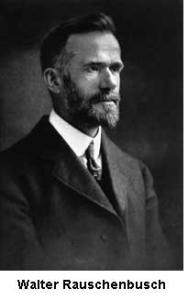Walter Rauschenbusch and the Social Gospel
A faithful follower of this blog asked me to post something about Walter Rauschenbusch which I’m glad to do. He is one of my heroes. Which is not to say I agree with everything he wrote.
Rauschenbusch was the son of a German immigrant who became a Baptist in the U.S. His father taught church history at Rochester Theological Seminary which is the oldest Baptist seminary in the U.S. Walter grew up in a very devout family and carried that devotion to Jesus Christ as Lord into his adult life. He became a professor at the same seminary as his father.
The department of Rochester Seminary where Walter and his father taught was the German branch. In the 1940s it separated from Rochester Theological Seminary in New York and moved to Sioux Falls, South Dakota. The new name was North American Baptist Seminary which is my alma mater.
Walter developed a strong sensitivity to social problems and advocated a “Christianizing of the social order” by which he did not mean establishment of a theocracy. He wrote a book by that title that spells out what he meant. He meant a social order organized by love. The love he advocated would be expressed socially by justice for all. Walter advocated a form of socialism. For example, he believed that Christians should establish only cooperative businesses; he despised the profit motive.
Walter wrote three popular books all of which are still in print. First was Christianity and the Social Crisis (1907). Then came Christianizing the Social Order (1912) and finally A Theology for the Social Gospel (1918).
He was deaf much of his adult life and died of stomach cancer in 1918. When I visited Rochester, New York, I went to the huge cemetery there where many people associated with the progressive movement are buried. Baptist theologian Augustus Hopkins Strong, a close friend of Walter’s, is buried there. I couldn’t find Walter’s grave so I inquired at the office and was told he was cremated.
Walter decried the social conditions of the laissez faire capitalism of the so-called “robber baron’s” era in America. He favored public policies that would make it possible for everyone to live a humane life. He advocated redistribution of wealth and laws to limit the power of corporations.
In his best-known book, A Theology for the Social Gospel, Walter attempted to show the social relevance of every major doctrine of the Christian faith. He ended up re-interpreting every doctrine in the light of the need for social transformation. He was influenced indirectly by liberal theologian Albrecht Ritschl although he strongly disagreed with the radical liberalism of Ritschl’s disciple Adolf von Harnack. Walter’s theology could be called the moralizing of dogma.
He was not so much interested in denying any doctrine as in re-interpreting it in light of the need for social morality. For him, the kingdom of God is not merely eschatological but also historical and could come, in part, through social transformation. He was not a revolutionary but a reformer.
Rauschenbusch’s orthodoxy has been called into question many times, but I have not found him to be heretical. Clearly, however, he was more interested in orthopraxy than orthodoxy. He believed that orthodoxy was already well established and, for the most part, it was, in his time. He did not align himself with the budding liberal movement in theology stemming from Schleiermacher and Ritschl, but he did believe Ritschl’s ideas had merit, especially his ideas about the kingdom of God as historical and social and not apocalyptic or merely eschatological. He strongly disagreed with the “life board ethic” of D. L. Moody and Billy Sunday.
On the other hand, Walter wrote a very long essay entitled “Why I Am a Baptist” in which he declared that he was a Baptist because the Baptist tradition is “experimental religion” by which he meant “experiential religion.” His own Christianity was warm-hearted and evangelical even if liberal socially and politically.
Walter was too conservative for out-and-out liberals like Henry Churchill King but too liberal for out-and-out conservatives like fundamentalist Machen.
I have been very much influenced by Rauschenbusch while wishing to remain more orthodox than he seemed to be because of his neglect of the doctrine of the Trinity which he could not find to be ethically fruitful. I believe German theologian Juergen Moltmann later demonstrated the moral and ethical fruitfulness of the doctrine of the Trinity. Moltmann is (as of this writing still alive) an heir of Ritschl’s and Moltmann’s but marked out his own path with realistic, historical eschatology as retrieved and reclaimed (from apocalypticism).
*If you choose to comment, make sure your comment is relatively brief (no more than 100 words), on topic, addressed to me, civil and respectful (not hostile or argumentative), and devoid of pictures or links.*














